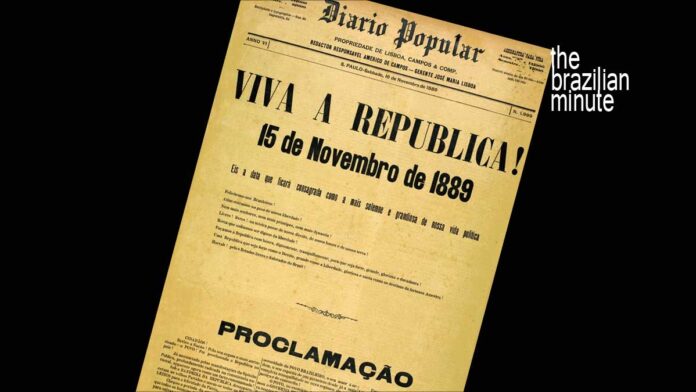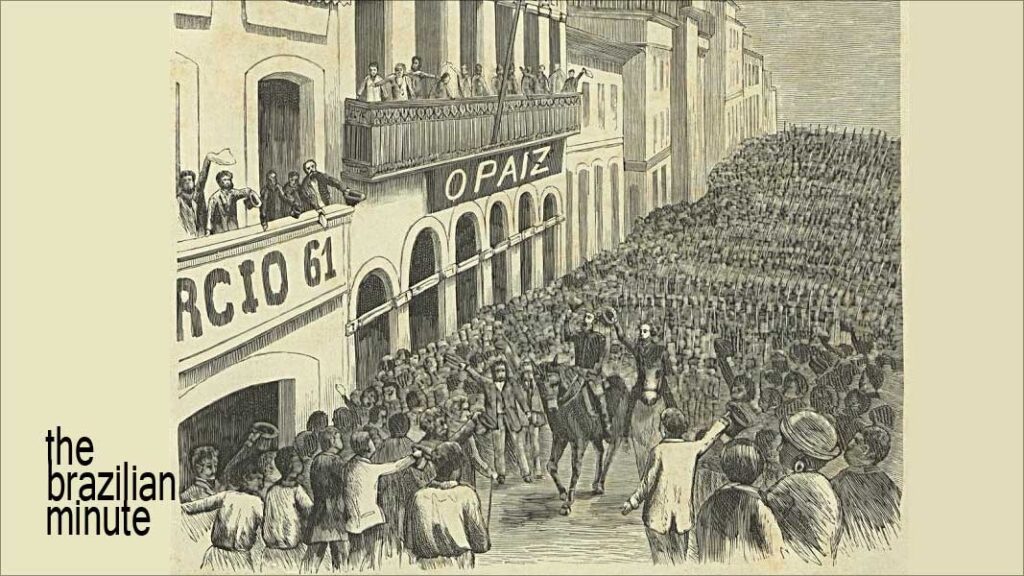
The Nation of Brazil Was Born On November 15th, 1889
Explaining Brazil’s Republic Day reveals the importance of freedom, self-determination, and cultural identity.
This series was presented by the Consulate-General of Brazil in Chicago and the Brazilian Foreign Ministry’s Cultural Department.
In celebration of Brazil’s Bicentennial year, 1822 – 2022
This week’s Brazilian Minute: Explaining Brazil’s Republic Day
Catch up with other Brazilian Minute episodes you may have missed!
Script from Audio:
An important event in Brazil’s history occurred on November 15th, 1889.
Proclamation Day for the Republic of Brazil, when Marshal Deodoro da Fonseca led a coup d’état against the Portuguese Empire, forcing Emperor Dom Pedro II to abdicate.
His father, Dom Pedro I declared independence on September 7, 1822, as Portugal’s control over the people of Brazil grew increasingly restrictive. Factions began to form. Those who favored an out-of-touch Empire against those who wanted freedom.
Years of skirmishes and battles followed, ultimately leading da Fonseca to that historic day.
Interestingly, the provisional flag of the Republic of Brazil debuted on that day, too. Inspired by the US flag it was officially replaced by the familiar design we know so well.
A new constitution followed in 1891.
Read and listen to new weekly episodes of The Brazilian Minute.

Explaining Brazil’s Republic Day
Overview
The Day of the Proclamation of the Republic of Brazil is celebrated annually on November 15th. Following that historic day, Brazil began to experience moments of important change. Let’s review.
Explaining Brazil’s Republic Day: Then and Now
The country began to experience a demographic shift from rural living to Brazil’s larger cities and urban centers. This trend resulted in greater opportunities for work and for education.
Also, Brazil was taking its first steps on the international front, seeking to intensify relations with neighboring countries.
The new nation of Brazil did this to distance itself from everything that the previous Empire represented. Wisely, Brazil’s leaders rethought their country’s international relationships, beginning with the South American continent.
In doing so, Brazil assumed a position of fraternity among American countries.
A Nation Of Nations
Consequently, Brazil’s melting pot identity defined itself. Between 1872 and 1930, migration to Brazil swelled to 2-3 million arrivals every year.
Brazilian Abolition occurred in 1888, a year before Brazil’s Proclamation of the Republic. The Lei Áurea (‘Golden Law’) is considered by historians as a catalyst to the fall of the Brazilian Empire.
Brazilian Music and Cultural Identity
From a historical and social point of view, Brazil’s nascent music styles contributed to the new nation’s cultural identity.
The Parlor music of Maxixe and Choro was taking shape and becoming popular among the social classes. Meanwhile, Samba was birthed in Rio by freed slaves who migrated south from Bahia to meet at Tia Ciata’s house on weekends. She lived across the street from Praca Onze (Park 11), mere blocks from today’s Sambadrome.
These impromptu parties soon took to the streets as cordões, the direct descendants of today’s samba school parades.
Another important result of Brazil’s Proclamation of the Republic helped to define how European influence was assimilated into Brazilian culture. This is especially true in literature and the arts.
It provided a framework for Brazil’s so-called modernists to consider, discuss, and define their new nation’s cultural identity.
This framework applied to Brazilian society in general and also to its creative community. Painters, writers, and poets helped their fellow citizens appreciate the idea that Brazil was actively creating a cultural richness of its own.
Understanding The Proclamation of the Republic Today
Notably, this artistic framework is important in historical terms. It made a statement to the nations of the world. Brazil would no longer be defined by European values but instead respected for its own, singular national cultural identity.
Historians write that the actions of Marshal Deodoro da Fonseca at dawn on the morning of November 15, 1889, were born out of necessity, urgency, and personal interests.
Ultimately, The Republic was officially declared later that afternoon in the City Hall of Rio de Janeiro.
A thorough recounting of that day reminds us that the foundations of freedom and self-determination are paramount to our human nature.
The timeliness of Brazil’s Proclamation of The Republic Day’s 133rd anniversary may also remind us of the importance of that fact.
This is how we see the transformations experienced with the events of that day. The debate about “the face of Brazil”, its culture, and its place in the world had begun.
The Proclamation of the Republic of Brazil
Here is the English translation text of the Proclamation, as given by Marshal Deodoro da Fonseca in Rio de Janeiro on Friday, November 15, 1889.
Part One
Fellow citizens: The people, the army, and the navy, in perfect harmony of sentiment with our fellow-citizens resident in the provinces, have just decreed the dethronement of the Imperial dynasty, and consequently the extinction of the representative monarchical system of government.
As an immediate result of this national revolution, of a character wholly patriotic, a provisional government has just been instituted, whose principal mission is to guarantee by public order the liberty and the rights of citizens.
To compose this Government until the sovereign nation by means of competent organs shall proceed to the choice of a definitive Government, the undersigned citizens have been chosen by the chief of the executive power.
Part Two
Fellow citizens: The provisional government, simply a temporary agent of the national sovereignty, is the government of peace, of liberty, of fraternity, and of order.
In the use of the extraordinary attributions and faculties with which it is invested for the defense of the integrity of the nation and for the security of public order, the provisional government, by all the means in their reach, promise and guarantee to all the inhabitants of Brazil, native or foreign, security of life and property, respect for all rights, individual and political, except as to the latter the limitations required by the safety of the country and defense of the Government proclaimed by the people, by the army, and by the navy.
Part Three
Fellow citizens: The functions of ordinary justice, as well as of civil and military administration, will continue to be exercised by the officials hitherto employed in relation to all acts, in the fullness of their effects; in relation to persons, the advantages and rights acquired by each functionary will be respected; but the life-term of the senate is hereby abolished, and also the council of state. The chamber of deputies is dissolved.
Part Four
Fellow citizens: The provisional government recognizes and will respect all national obligations contracted during the previous regimen, treaties subsisting with foreign powers, the public debt, external and internal, existing contracts, and further obligations legally contracted.
— Marshal Manoel Deodoro da Fonseca, Chief of the Provisional Government.
Explaining Brazil’s Republic Day
Did you enjoy ’Explaining Brazil’s Republic Day’? If you did, why not join us at Connect Brazil?
Sign up for our emails on Brazilian music, travel, friends, and fun. Listen to our ‘always live’ streaming station and streaming music channels, always free. Visit us on Facebook, and Twitter, and browse our Lifestyle Directory for Brazilian events coast to coast.










